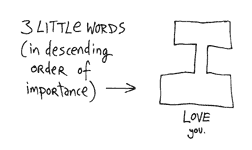The language of love

There are two kinds of people in the world: those who say "I love you" and those who don't.
I know friends (both from America and other cultures) who have gone their entire lives without hearing a parent say that. On the surface, that makes me desperately 'hide-the-razor-blades' kind of sad. When I dig down a little further, I think maybe part of it is simply culture / upbringing. Some people just aren't raised to express their feelings that way, and pass that handicap on to their children. Like that line from the Reba McIntyre Greatest Man I Never Knew song: "he never said he loved me, guess he thought I knew."
For others, they say it, but only rarely, and only to 'that person.'
Maybe it's because there's so much perceived vulnerability in 'those three little words.' Great comedy routines, Seinfeld among others, exist around the natural tension created: when do I say it? What if she doesn't say it back? What does it MEAN? Oh, geez - he said it. Am I supposed to say it back? What if I don't?
Me? I am steadfastly in the camp of the "I love you" sayers. IN fact, I say it to a reasonable number of people in my "inner circle" of friends, relatively frequently. It's not uncommon for me to end a phone call, email, or visit with "Love you" or, the slightly funnier but still sincere, "Love you. Mean It." (Yes, this does beg the question of how Mr. Right knows he's any different. A) that bridge will be crossed when we come to it, and B) honestly, if he doesn't get it, then he's not Mr. Right. Hello?!?!)
So entry number one hundred and six (or whatever) on the list of things I love about Italy: they have, count 'em, at least TWO commonly used versions of I love you!
One is for 'that someone' and the other is for the 'inner circle'. How perfect!
Ti amo: the verb, Amare - means to love 'profoundly' when used for people (differently for, 'plants love the sun'). So this is literally, 'You I love.'
Ti Voglio: literally translated into "You I want." It's the shortened version of 'ti voglio bene', I want you good? Hmmm. This all sounded not quite like the sweet thing that sons say to mothers, friends to each other. Obviously I was confused by the context of 'wanting' in this expression, and the Expats In Italy website that I belong to finally cleared it up: it means, effectively, I want good for you. It's the commonly accepted form of 'I love you' in a platonic, 'you are a connection in the world and I really care about' you kind of way.
Now that I stop to think about it, there are probably just as many angst ridden moments in Italian about making the leap from Ti voglio bene to Ti amo.
I guess what it really comes down to is that it annoys me that in English, we don't have a commonly accepted way to say to friends, "ti voglio bene". So some of us just push boldly ahead, saying "I love you" in both contexts and presuming that the aforementioned friend knows on which side of the line that message is supposed to fall. Ah-ha. Now I get what people say about English being so hard to learn.
Quick PS: the cute cartoon above is by the brilliantly talented guy whose art adorns my new blog-cards (sample forthcoming), Hugh at gapingvoid. His sense of humor is caustic, cathartic, and generally right-on-target.
PPS: Hey, you. Yes ... you. Ti voglio bene. ;>


1 Comments:
I really like this post, Viaggiatore. I, too, am a liberal "I love you" sayer. I never say it and don't mean it, but I also never let an opportunity pass me by to say it to someone important. You just don't know if the chance will come again. Life's too short.
Hey - and I'm glad that we're in touch again. I love you!
-JillyBean
Post a Comment
<< Home